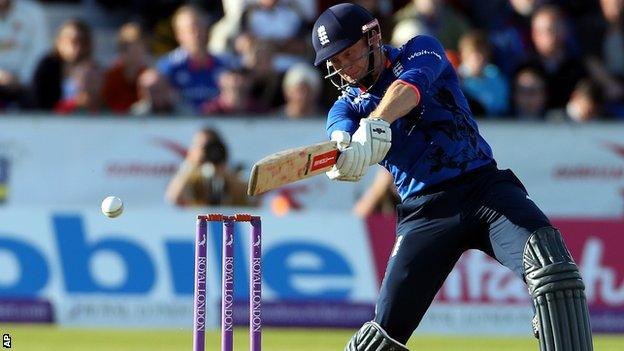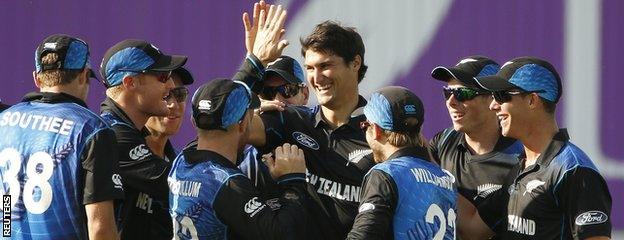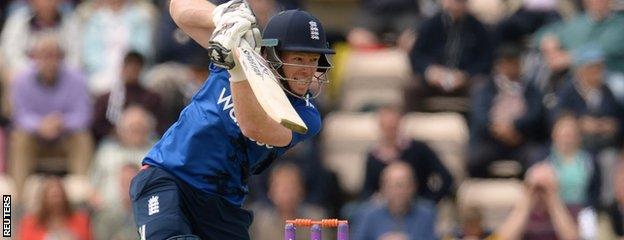England v New Zealand: ODI energy can spur Ashes success
- Published

Jonny Bairstow was the seventh England batsman to hit a half-century in the series
England's one-day cricket has undergone an utterly remarkable transformation in the space of just five matches.
To go from the dismal lows of the World Cup only three months ago, to beating the finalists of that tournament with exhilarating, confident cricket is quite extraordinary.
England have beaten New Zealand at their own game: they have played in an attacking, enterprising way, abandoning the caution that characterised the ill-fated Peter Moores era and giving their young players free rein to show their skills.
What has changed?
If you're looking for the driving force behind England's transformation, you need look no further than their opponents.
New Zealand in the World Cup really caught everybody's imagination with the way they played the game - not just with bat and ball, but with their whole spirit: no fear, no recriminations, and no sledging.

England learnt lessons from New Zealand's positive approach
Everything about it was a benchmark - and England saw at first hand exactly what they had to do bring their one-day cricket up to speed with the modern game.
England have looked a completely different side in this series, and not only have they enjoyed being liberated as far as their style of play is concerned, they've also thrived on the spirit in which this series has been played. It's been played in the proper way, very competitive but also respectful, and that has allowed England to flourish.
Can England keep it up?
That is down to the players. It's not easy to suddenly change your game, but England have managed it - the challenge now for Eoin Morgan's men is to continue to play with the same spirit of adventure.
For the first time in a long time, there are suddenly good vibes around the one-day team. Young players like Alex Hales and Adil Rashid have come into the team and given the side a real lift.
Let's not kid ourselves: New Zealand's bowling attack in this series was inexperienced, they weren't the same side that performed so well in the World Cup, but for me the result is almost beside the point. It's the transformation in England's whole approach that gives me optimism for the future.
England's key players
Joe Root and Jos Buttler both batted absolutely magnificently in this series. Root has become such a consistent performer for England in all formats, while Buttler is a composed cricketer who has a knack of always making the right decisions.
For me though, two players who aren't part of England's Test side have really stood out: captain Eoin Morgan and spinner Adil Rashid.

England one-day captain Eoin Morgan scored three fifties and a century in the series
Morgan is batting better than ever. He had a poor World Cup where he looked horribly out of form, and many people thought that might even be the end. But he's come back and played brilliantly: he's such a clever batsman and when he plays with real audacity he has the ability to score runs all around the wicket.
A lot of credit has to go to England's cricket director Andrew Strauss: he gave Morgan a vote of confidence as ODI captain, external and that has given him a real boost.
Rashid came into this series with a lot of question marks hanging over him, but he has done enough to show he can bowl well under pressure.
He didn't have it easy in a series dominated by aggressive batting but I liked the way he was unafraid to toss the ball up and give it some air. He's a very capable lower-order batsman too, equally adept at deft shots and power hitting.
It's a terrible shame that England didn't bowl him on spin-friendly pitches in their recent Test series against the West Indies. People will talk about Rashid possibly coming in to the Test side for the Ashes but I can't see that happening: I think there will be a reluctance to play him as the sole spinner.
Areas for improvement
England's fielding has to improve. Their ground-fielding was OK, but the catching was generally below par, they dropped far too many chances.
Like New Zealand, England suffered from some very expensive bowling in the death overs at the end of the innings. A lot of that was down to good batting but I'd like to see more determination to bowl yorkers.
Batting-wise, the positive intent is great but it's got to be done sensibly. There's a fine line between being aggressive and being reckless.
Can they take it into the Ashes?
That is the big question. A lot will depend on how the key men who haven't played in this ODI series - the likes of Stuart Broad, James Anderson and Alastair Cook - return to camp.
I think they will have a feel for what's happened here, and be very energised by how England have played.

Paul Farbrace won four of his seven matches across all formats as England's interim coach
It's important that Paul Farbrace continues to have an influence. He will be replaced as head coach by Trevor Bayliss for the Ashes, but he has done a brilliant job in his interim reign.
He has worked well with Bayliss in the past when they were in charge of Sri Lanka together, and I'm sure Bayliss will want to pick Farbrace's brains about how he has overseen this remarkable transformation.
The first match in Cardiff is very important. England can't afford lose that first Test. They will have to play at the top of their game to beat Australia, but I don't think anyone would write them off.
Jonathan Agnew was speaking to BBC Sport's James Gheerbrant.
- Published20 June 2015

- Published20 June 2015

- Published18 October 2019
